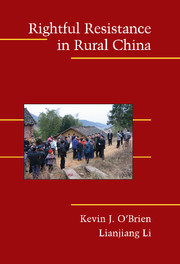Book contents
6 - IMPLICATIONS FOR CHINA
Published online by Cambridge University Press: 05 September 2012
Summary
Although the previous chapter emphasized relatively small-scale changes rather than dramatic policy effects or institutional breakthroughs, rightful resistance may also have larger implications for state-society relations and political change. First, insofar as rightful resistance creates hardened activists and affects the way Chinese villagers think about the responsibilities of the powerful, microlevel shifts in values may presage a transformation in political identities. Second, the rising number of otherwise unrelated episodes of rightful resistance may together inspire power holders to consider policy innovations and institutional reforms. Third, if rightful resistance continues to spread and escalate, it could have implications for the regime's durability, as activists begin to insist that central policy makers apply their own rules to themselves and abide by principles they have established.
Citizenship
Consider the following story: More than five months had passed, but the oversized characters scrawled on a storefront in the center of a Hebei village were still legible. “We're citizens. Return us our citizenship rights. We're not rural labor power, even less are we slaves. Former village cadres must confess their corruption” (see Figures 4 and 5). The village leaders had little doubt who was behind this infuriating graffiti – namely, several of the twenty rightful resisters who had tried to topple the village Party secretary and his predecessor for practicing graft – but they felt it was unwise to take any action. The corrupt cadres were said to be afraid that whitewashing the wall would only add fuel to the complaint and confirm their guilt.
- Type
- Chapter
- Information
- Rightful Resistance in Rural China , pp. 116 - 130Publisher: Cambridge University PressPrint publication year: 2006

